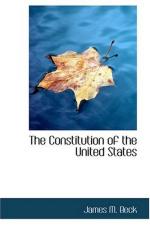In the absence of any government and in the period of general prostration it was not unnatural that the spirit of Bolshevism grew with alarming rapidity. It even permeated the officers of the Army. In March, 1783, an anonymous communication was sent to Washington’s officers to meet in secret conference to take some action, possibly to overthrow the government. A copy fell into Washington’s hands and, while he forbade the assemblage of the officers under the anonymous call, he himself directed the officers to assemble. He unexpectedly appeared at the meeting and, being no speaker, he had reduced his appeal to writing. As he adjusted his spectacles to read it, he pathetically said: “I have not only grown gray but blind in your service.” He then made a touching appeal to them not to increase by example the spreading spirit of revolt. The very sight of their old commander turned the hearts of the revolting element and the officers remained loyal to their noble leader.
Where the spirit of disaffection was thus found in high places it naturally prevailed more widely among the masses who had been driven to frenzy by their sufferings. This culminated in a revolt in Massachusetts under the leadership of an old soldier named Shays, and it spread with such rapidity that not only did one-fifth of the people join in attempting to overthrow the remnant of established authority in Massachusetts, but it rapidly spread to other States. The offices of government and the courthouses were seized, the collection of debts was forbidden, and private property was forcibly appropriated to meet the common needs.
Chaos had come again. It filled Washington’s heart with disgust and despair. After surrendering his commission to the pitiful remnant of the government he had retired to Mount Vernon, and for a time declined to act further as the leader of his people. Thus, in October, 1785, he wrote James Warren, of Massachusetts:
“The war, as you have very justly observed, has terminated most advantageously for America, and a fair field is presented to our view; but I confess to you freely, my dear sir, that I do not think we possess wisdom or justice enough to cultivate it properly. Illiberality, jealousy, and local policy mix too much in all our public councils for good government of the union. In a word, the Confederation appears to me to be little more than a shadow without the substance, and Congress a nugatory body, their ordinances being little attended to.... By such policy as this the wheels of government are clogged, and our brightest prospects, and that high expectation which was entertained of us by the wondering world, are turned into astonishment; and, from the high ground on which we stood, we are descending into the vale of confusion and darkness.”
Again he wrote to George Mason:
“I have seen without despondency, even for a moment, the hours which America has styled its gloomy ones, but I have beheld no day since the commencement of hostilities that I thought our liberties in such imminent danger as at present. Indeed, we are verging so fast to destruction that I am feeling that sense to which I have been a stranger until within these three months.”
Again in 1786 he writes:




